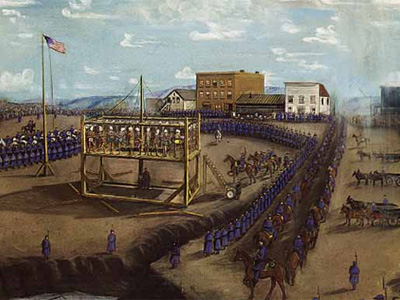
It’s Abraham Lincoln’s birthday and the nation’s leaders are making the appropriate tributes today. President Obama, speaking in Illinois, said without Lincoln, he would not today be president. No quibble there. But there is history, and there is legend, and on this day, particularly in Minnesota, we find ourselves consumed by the legend, and ignoring aspects of history.
Truth is, there’s far more to the history of Abraham Lincoln than black and white. There’s more to him than the Civil War and the Gettysburg Address. There’s more than what they teach about Lincoln in the classrooms of America.
There is Minnesota and the Dakota Indians.
The Dakota gave up their homeland — most of southern Minnesota — in an 1851 treaty. The U.S. agreed to pay $500,000 to move them and pay the Dakota debts to traders. They saw very little of the money.
President Buchanan told the Dakota they had to move off a portion of the reservation the treaty created. A white family in Acton, Minnesota was killed and the Dakota leader — Little Crow — declared war on the settlers. Only women and children were taken prisoner by Little Crow.
After many battles, Little Crow fled to the Dakota Territory. Gen. Henry Sibley eventually rounded up the Dakota who participated in the uprising.
This is where the opportunity for a more scholarly discussion in Minnesota of Lincoln has its greatest opportunity, and suffers its annual disappointment. Hundreds of Native Americans were sentenced to death. Lincoln commuted all but 38, whom he believed to be guilty of the most heinous crimes.
Their trials were considered by many historians to be farces. According to Douglas O. Linder on the Dakota Trials Web site…
The trials were quick affairs, getting quicker as they progressed. The commission heard nearly forty cases on November 3, the last day it met. The commission believed that mere participation in a battle justified a death sentence, so in the many cases, perhaps two-thirds of the total, where the prisoner admitted firing shots it proceeded to a guilty verdict in a matter of a few minutes. Somewhat more deliberation was required for trials in which the charge was the murder or rape of settlers, because admissions were much rarer in these cases. After the defendant gave whatever response he cared to make to the charge, prosecution witnesses were called. Where prosecution witnesses contradicted the testimony of the defendant, the commission almost invariably found the prisoner to be guilty.
On December 26, 1862, 38 were hanged in Mankato. The largest mass execution in the history of the United States took place under orders of Abraham Lincoln.
Was Lincoln an example of compassion for sparing the deaths of hundreds? Or were 38 sent to their deaths because of the political pressure of responding to the deaths of over 400 white people? Lincoln reportedly was shaken by the hangings and vowed to change U.S. policy toward Native Americans. What if he had?
They’re fascinating questions, but — for the record — no mention of Mankato was mentioned in either Midmorning’s hour-long discussion of Lincoln today, nor Midday’s broadcast of the NPR special on Lincoln this afternoon, and a tribute at the Minnesota House of Representatives made no mention.
It’s almost as if the events in Minnesota never happened.
(Image: Minnesota Historical Society)
